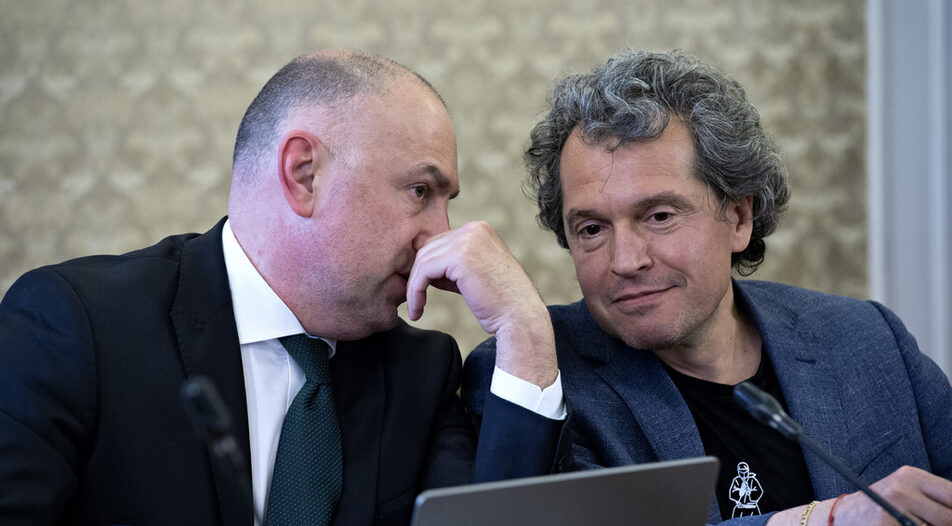There Is Such People's leader Slavi Trifonov's decision to withdraw his party from the coalition government could have severe economic consequences for Bulgaria. The chance of new early elections is big enough. This could mean a caretaker cabinet and a National Assembly not functioning for several months. New elections - the fourth since April 2021, do not, however, guarantee a stable government. Bulgaria could - once again, fall into a spiral of elections.
All this will result in a complete halt to reforms and changes in legislation needed to unlock billions from the Recovery and Resilience Plan. Also, the political crisis could slow Bulgaria on its way to the eurozone and lead to dysfunctional regulators and problems in the energy sector.
Frozen money under the Recovery Plan
Bulgaria has 12 billion levs (6 billion euro) under the Recovery Plan. An obligatory condition for receiving them is reforms. The document, finally approved by the European Commission in early May, outlines dozens of legislative and institutional reforms. If Bulgaria doesn't implement them, European funds will not be allocated. In the absence of a regular government and parliament, there is no chance for the key reforms to start this year. This will be a great omission for the Bulgarian economy, which will not be able to use the EU funds and drive new investments during the crisis. The country still has not prepared documents for applying for billions of levs under the loan part of the European plan.
The situation with the operational programs for the new programming period is slightly different. If the current government sign a Partnership Agreement with the European Commission by the end of June, some procedures could start by the end of the year. For the new period, the total amount of EU funds, subsidies and loans under the Plan is 48 billion levs.
Shifting away from the eurozone
Slavi Trifonov's party has been against Bulgaria's fast entry into the eurozone. In recent weeks, TISP has paved the way for a massive anti-euro campaign by other parties such as opposition nationalist Vazrazhdane of Kostadin Kostadinov and Bulgarian Rise founded by ex-caretaker Prime Minister Stefan Yanev.
Leaving the coalition will not have a direct effect on the plans for euro adoption, as it is not a specific decision that needs to be voted on now. But the collapse of the government may delay the necessary legislative changes and reforms, and the target date of January 1, 2024, will become completely impossible to meet.
Energy problems again
Some of the key changes in the legal framework, which the parliament has to adopt by the beginning of the summer, are in the field of energy. They are in several directions - regulation of the possibility of energy companies to realize excessive profits; creation of an automatic model for compensating businesses when electricity and gas prices are extremely high; introduction of higher tariffs for consumption above certain levels. If the parliament is dissolved, these changes will not be made and the state could hardly help businesses cope with soaring energy prices.
The same old regulators
The Commission for Protection of Competition (CPC) and the Financial Supervision Commission (FSC) have been dangerous enemies of businesses, at least for the last decade. Without parliament, the antitrust authority will remain occupied by disputed forces. Their composition was about to change in days when the adoption of a new law was expected. Now, without the votes of the TISP, the change is almost impossible.
As expected, opposition GERB and MRF voted against the changes in the first reading. When Boyko Borissov was prime minister, the government used the CPC to pressure businesses with huge fines and rearrange public procurement and concession procedures, while turning a blind eye to monopolies and cartels.
The situation is similar to the chairman of the Financial Supervision Commission, who controls billions-worth of businesses such as insurers, pension funds and listed companies. The mandate of Boyko Atanasov who is close to GERB and MRF expires at the end of July.
There Is Such People's leader Slavi Trifonov's decision to withdraw his party from the coalition government could have severe economic consequences for Bulgaria. The chance of new early elections is big enough. This could mean a caretaker cabinet and a National Assembly not functioning for several months. New elections - the fourth since April 2021, do not, however, guarantee a stable government. Bulgaria could - once again, fall into a spiral of elections.
All this will result in a complete halt to reforms and changes in legislation needed to unlock billions from the Recovery and Resilience Plan. Also, the political crisis could slow Bulgaria on its way to the eurozone and lead to dysfunctional regulators and problems in the energy sector.












